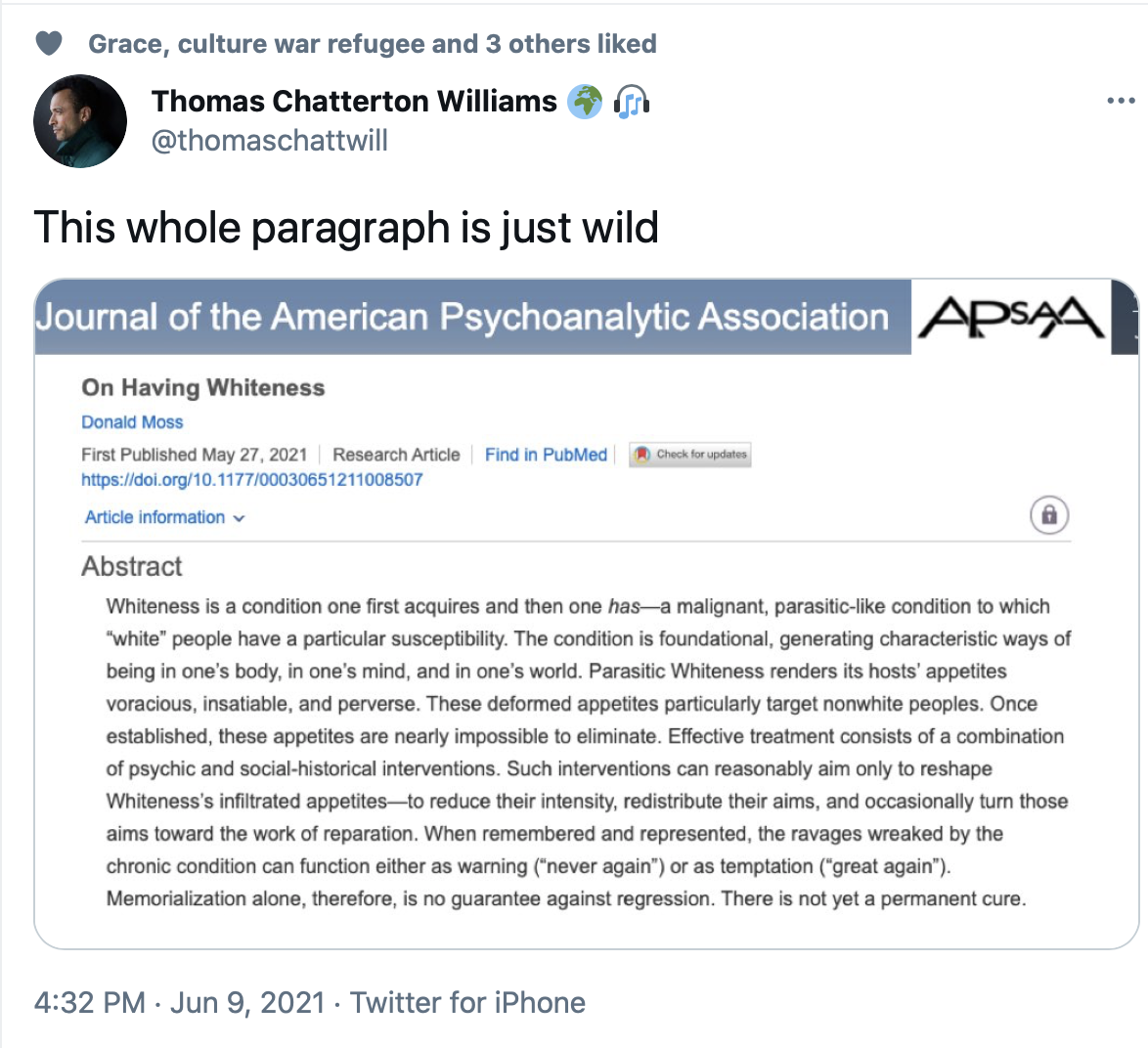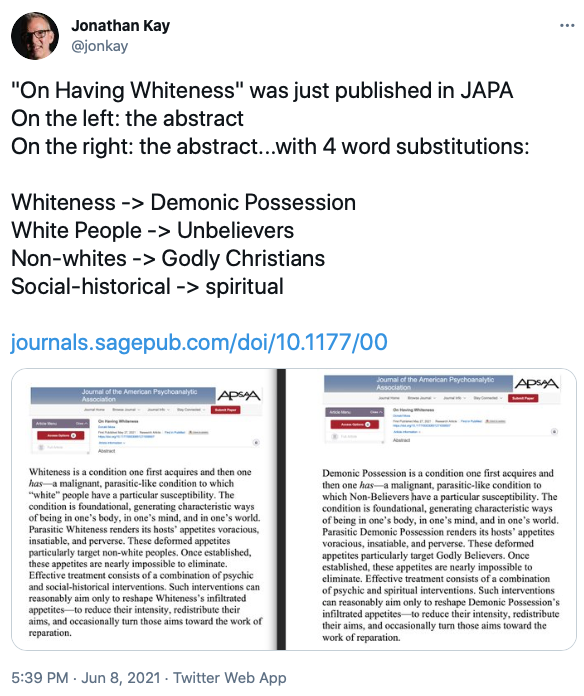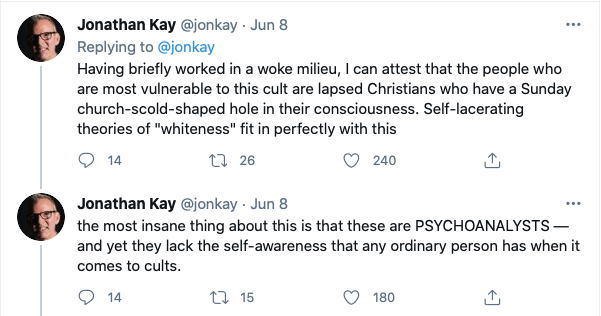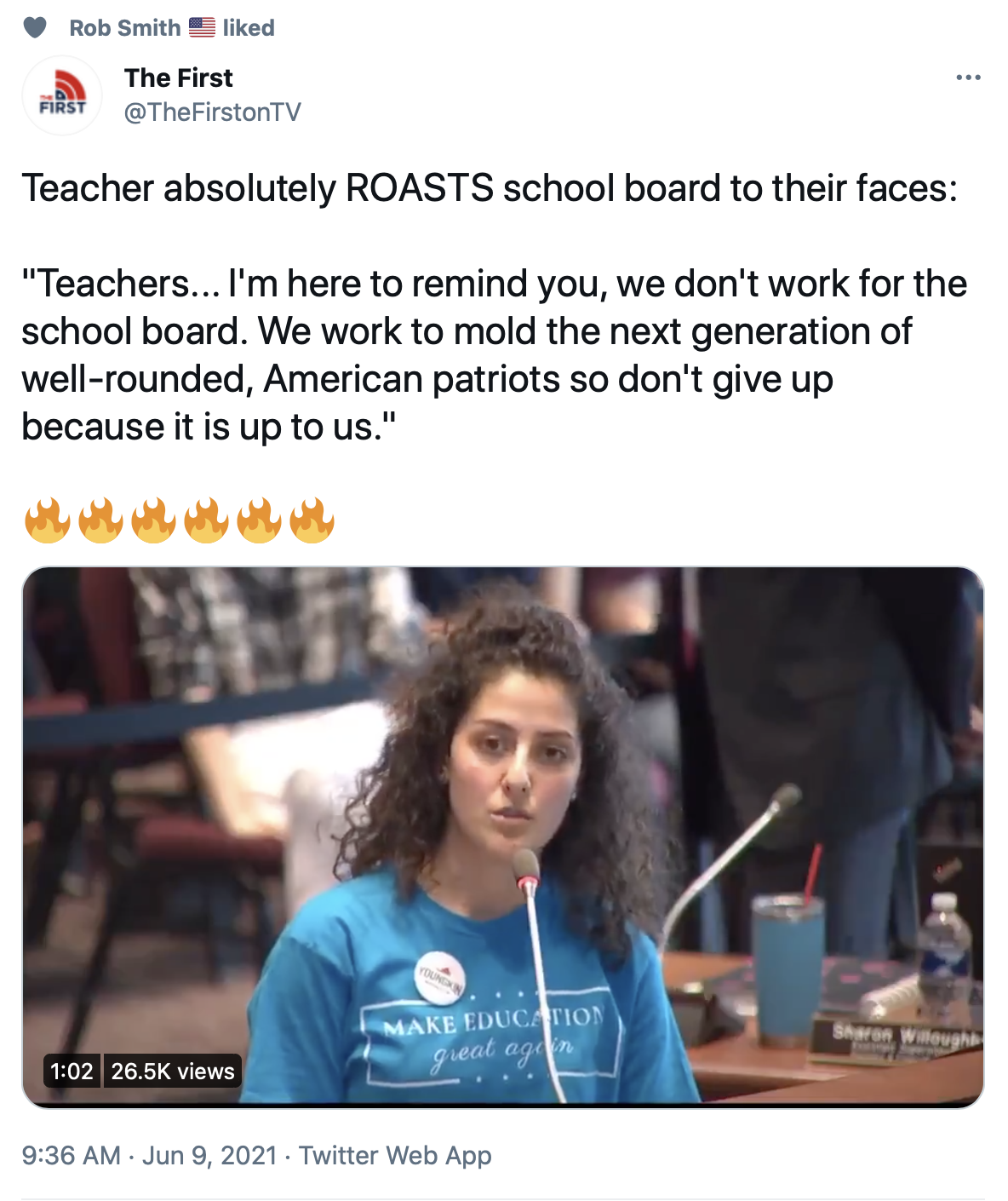Christopher Rufo has been working overtime to expose critical race theory to the sunlight (and see here). CRT is being taught in many schools, including posh private K-12 schools, and it is a very good thing that Rufo has provoked conversations on the content of CRT curricula and training (in schools, government offices and businesses). I agree with many of Rufo's concerns and I appreciate the hard work he has done to make CRT concepts understandable to the many people who are intimidated by CRT rhetoric. As I have discussed many times at this website, CRT is divisive, causing people to lose trust in each other, causing unnecessary suspicions, and failing to promote human flourishing in any meaningful way. I've argued that the end game for CRT is the massively dysfunctional social atmosphere at Evergreen State College. Though I applaud the publication of the Briefing Book, I disagree with Rufo on his enthusiasm for legislative solutions he promotes.
Rufo has recently published a "Critical Race Theory Briefing Book" to help people understand what is currently being peddled under the tents of "antiracism" and "critical race theory." People are starting to speak up about their concerns with CRT (e.g., this recent statement by a public school teacher), but we need to help more people to understand the racecraft being peddled by CRT, and Rufo's Briefing Book will be helpful in that regard. He obtains much of his material from original sources--the Briefing Book is filled with quotes from critical race writers. He has also boiled down these principles into readable nuggets. In doing this, Rufo will be helping many parents, students and employees to understand CRT, which is permeated with vague concepts and familiar-looking words that CRT uses to mean the opposite of their common meanings.
Here is Rufo's definition of "Critical Race Theory, which appears at the beginning of his Briefing Book:
Critical race theory is an academic discipline that holds that the United States is a nation founded on white supremacy and oppression, and that these forces are still at the root of our society. Critical race theorists believe that American institutions, such as the Constitution and legal system, preach freedom and equality, but are mere “camouflages” for naked racial domination. They believe that racism is a constant, universal condition: it simply becomes more subtle, sophisticated, and insidious over the course of history. In simple terms, critical race theory reformulates the old Marxist dichotomy of oppressor and oppressed, replacing the class categories of bourgeoisie and proletariat with the identity categories of White and Black. But the basic conclusion is the same: in order to liberate man, society must be fundamentally transformed through moral, economic, and political revolution.
Another key concept of CRT is "Whiteness." Here is how critical race advocates commonly explain "whiteness," (this is another excerpt from the Briefing Book:
Race essentialism: Critical race theory reduces individuals to the quasi-metaphysical categories of “Blackness” and “Whiteness,” then loads those categories with value connotations—positive traits are attributed to “Blackness” and negative traits are attributed to “Whiteness.” Although some critical race theorists formally reject race essentialism, functionally, they often use these categories as malicious labels that erase individual identities.
“Whiteness is dynamic, relational, and operating at all times and on myriad levels. These processes and practices include basic rights, values, beliefs, perspectives and experiences purported to be commonly shared by all but which are actually only consistently afforded to white people.” Robin DiAngelo, “White Fragility.”
“Whiteness is an invisible veil that cloaks its racist deleterious effects through individuals, organizations, and society. The result is that White people are allowed to enjoy the benefits that accrue to them by virtue of their skin color. Thus, Whiteness, White supremacy, and White privilege are three interlocking forces that disguise racism so it may allow White people to oppress and harm persons of color while maintaining their individual and collective advantage and innocence.” Derald Sue, “The Invisible Whiteness of Being.”
“Whiteness by its very definition and operation as a key element of white supremacy kills; it is mental and physical terrorism. To end the white terrorism that is directed at racially oppressed people here and in other nations, it is essential that self-identified whites and their whiteness collaborators among the racially oppressed confront their white problem head-on, unencumbered by racial comfort.” Johnny Williams in the Hartford Courant.
All whites are racist: Critical race theorists argue explicitly that “all white people are racist” and perpetuate systems of white supremacy and systemic racism. This concept is deeply related to race essentialism—whites, including small children, cannot escape from being racist.
“All white people are racist or complicit by virtue of benefiting from privileges that are not something they can voluntarily renounce.” Barbara Applebaum, Being White, Being Good.
“White identity is inherently racist; white people do not exist outside the system of white supremacy.” Robin DiAngelo, White Fragility.
“According to studies, babies at two to three years old, start internalizing racist ideas, start discerning and making decisions based on racist ideas … We’re allowing our society to raise them to be racist.” Ibram Kendi on KING5 News.
Are these the types of things you want your schools to teach your children? Are you willing to draw a thick line to tell the Woke movement
no? In my view, the excerpts above are racist and destructive ideas that are incompatible with the teachings of Martin Luther King. That is why you will not see CRT advocates discussing MLK, by the way.
This is Rufo's opinion too. Where I disagree with Rufo is on how to best oppose the rapid spread of CRT.
You can read the entire Briefing Book here.




